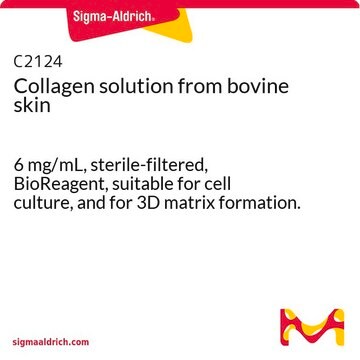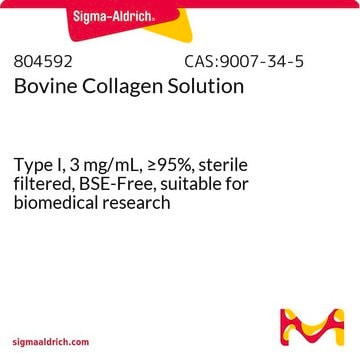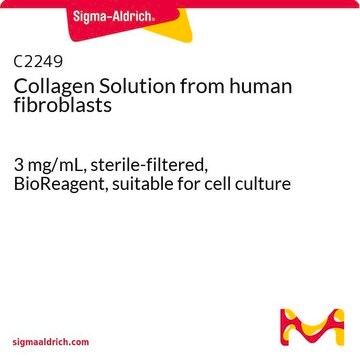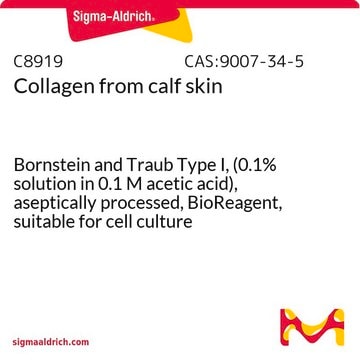C4243
Bovine Collagen Type I
from bovine skin, liquid, 2.9-3.2 mg/mL, ≥99.9% (SDS-PAGE), suitable for cell culture, used for 3D gel formation
Synonym(s):
Bovine collagen solution, Collagen extract
About This Item
Recommended Products
product name
Collagen solution from bovine skin, Type I, 2.9-3.2 mg/mL, suitable for cell culture, sterile-filtered
biological source
bovine skin
Quality Level
sterility
sterile-filtered
product line
BioReagent
assay
≥99.9% (SDS-PAGE)
form
liquid
packaging
pkg of 100 mL
pkg of 20 mL
concentration
2.9-3.2 mg/mL
technique(s)
cell culture | mammalian: suitable (and for 3D matrix formation)
surface coverage
6‑10 μg/cm2
suitability
gelation test tested
UniProt accession no.
binding specificity
Peptide Source: Fibrinogen
foreign activity
endotoxin ≤1.0 μmole/min-mg protein
shipped in
wet ice
storage temp.
2-8°C
Gene Information
human ... COL1A1(282187)
Looking for similar products? Visit Product Comparison Guide
Related Categories
General description
Application
- in the preparation of collagen gels.
- to coat cell culture dishes for HeLa cell line culture.
- to construct hydrogels laden for HepG2 cell culture.
Biochem/physiol Actions
Components
Caution
Preparation Note
Other Notes
related product
Storage Class
12 - Non Combustible Liquids
wgk_germany
nwg
flash_point_f
Not applicable
flash_point_c
Not applicable
ppe
Eyeshields, Gloves, multi-purpose combination respirator cartridge (US)
Certificates of Analysis (COA)
Search for Certificates of Analysis (COA) by entering the products Lot/Batch Number. Lot and Batch Numbers can be found on a product’s label following the words ‘Lot’ or ‘Batch’.
Already Own This Product?
Find documentation for the products that you have recently purchased in the Document Library.
Customers Also Viewed
Articles
The extracellular matrix (ECM) and its attachment factor components are discussed in this article in relation to their function in structural biology and their availability for in vitro applications.
Extracellular matrix proteins such as laminin, collagen, and fibronectin can be used as cell attachment substrates in cell culture.
Our team of scientists has experience in all areas of research including Life Science, Material Science, Chemical Synthesis, Chromatography, Analytical and many others.
Contact Technical Service












